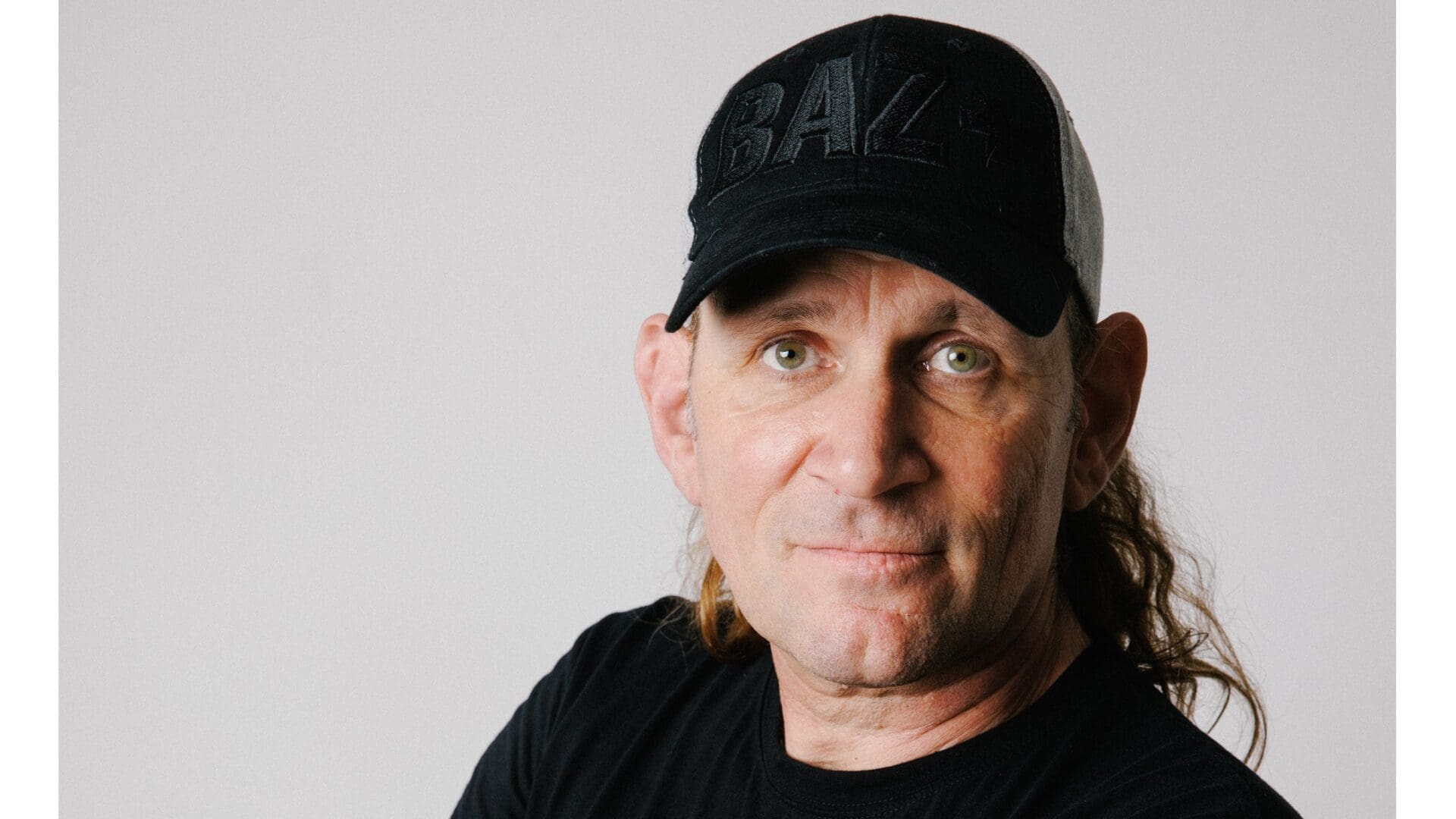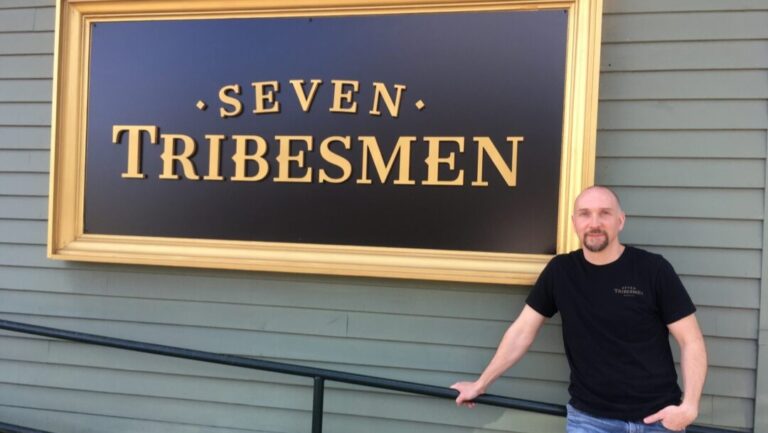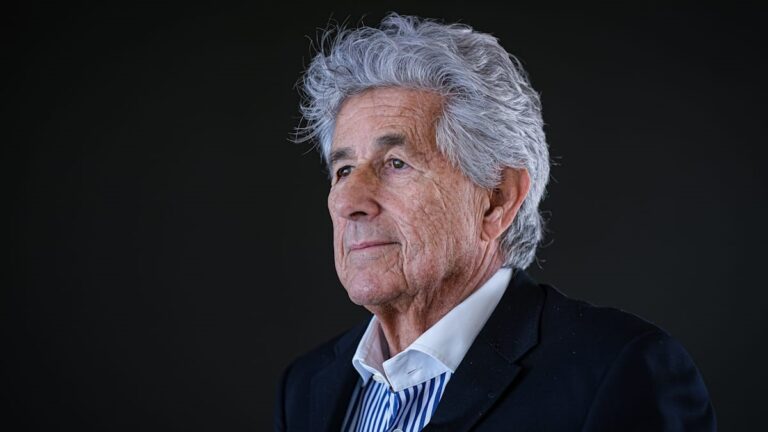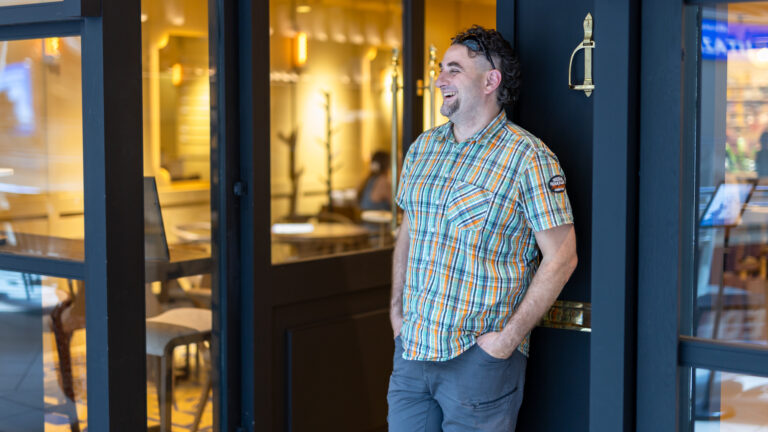The following is a translation of an interview by Dániel Kacsoh in the Mandiner weekly.
‘In the realm of eyes wide open, / the picture shines so bright, / a tightrope’s what life dances upon, / A chasm below, hold on tight’. What is the meaning of life for you?
Wow, if I knew, you wouldn’t call me László Lukács, but Jesus Christ instead! Setting humour aside, I have never regarded myself as profoundly philosophical. When it comes to expressing my thoughts on this subject, I prefer to convey them through the lyrics of my songs of this nature. There are quite a few of them. I’ve always been able to communicate best through our compositions, and lyrics are multi-layered tools that offer multiple interpretations.
Anyway, it sounds like a question familiar from a high school exam: ‘What was the poet thinking?’ Maybe it’s just because he liked that glass of beer, but fifty years later deep symbolic meanings are likely to be deciphered from the text. I don’t wanna be a smartass.
Don’t you mind being misunderstood?
Come on! Feel free to analyse my words as you wish! My job is to sing them, and whoever can identify with them on any level, I’m happy with that. I have no expectations.
Do you want to entertain or send a message?
The two cannot be sharply separated. A lyric full of thoughts can be fun, and vice versa.
Hardcore lyrics persist from the early albums to the latest releases, albeit, I might add that the dynamism of the use of this artistic tool has changed. Do any songs exist that you can no longer resonate with?
Thank God, I could not name one. Basically,
I was and still am consistent with myself, if you like, I’m the same guy I’ve always been. Authentic.
Of course, this doesn’t mean that I haven’t changed a lot, or that I live the same as I did back then, but I’m not ashamed of anything.
‘I have no name, no money. / Why should I be happy?’ you wrote thirty-five years ago.
Well, obviously this is no longer true in this form. I have made money and a name for myself. On the other hand, from those guys who are seventeen or twenty years old today and feel this way, why should we take away the opportunity to shout this out at a Tankcsapda concert?
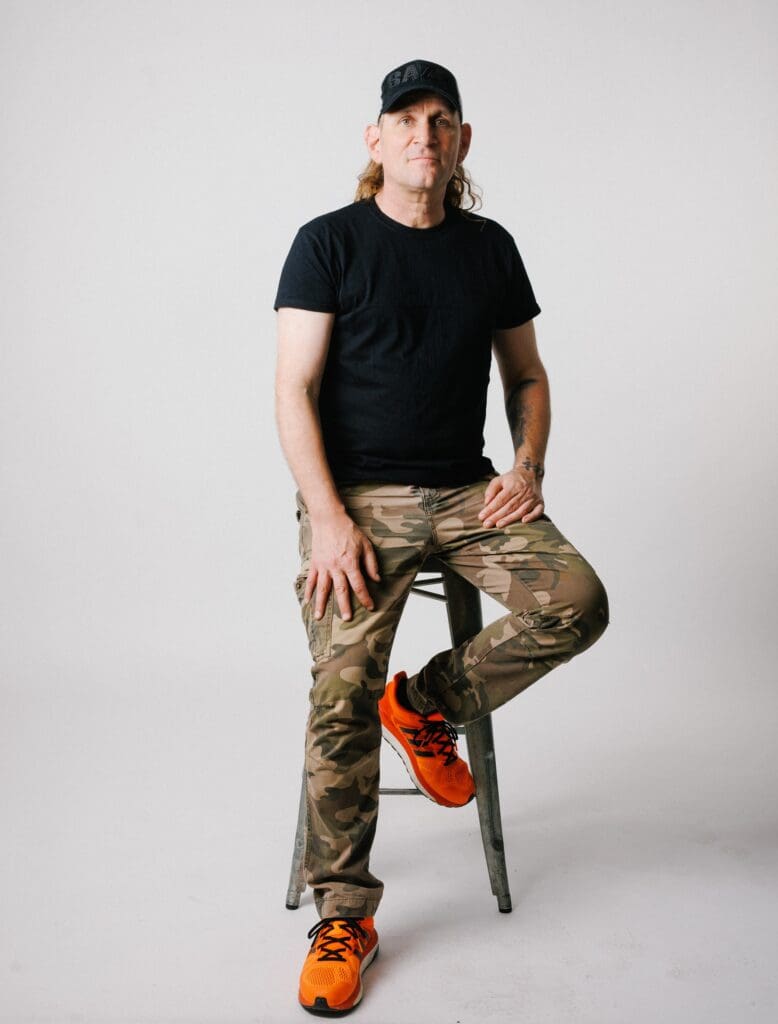
Speaking of roaring: the music you play is ‘angry’. What else are you angry about?
Primarily human stupidity is what angers me the most, or more precisely its manifestations. Whether it’s the mindless bickering and taunting that takes place both in the physical and the virtual sphere, or the act of polluting our world. However, it is important: basically, I am a peaceful person, and I reject physical violence—it is no coincidence that I have been a vegetarian for decades. I have always expressed my anger through my lyrics and music, but the anger that I felt in my twenties is still within me today—it just appears in a different form.
Give me an example.
When my favourite team scores a goal, I no longer climb up the B sector and shake the fence; instead, I raise my pint or whistle. Joy is still joy. The same applies to anger.
‘We were able to stay sane’, you said earlier. More than three decades at the forefront of popular music can pose great challenges in this regard. How did you succeed?
For example, we started as a band from Debrecen, and we still are. Instinctively or consciously, we didn’t let ourselves be carried away by the kind of stardom that doesn’t really exist in a country of this size. Nevertheless, even I had such a phase, especially in the first decade, when I wanted ‘a lot of good from lots of good.’ You know, it’s those times when Saturday is followed by a Tuesday morning. But that is not the point.
It is much more important that if a person has a commitment and an idea about life, knows where he is going, and in the meantime, others may indicate that the cart is put before the horse; and even if one lives in calm Debrecen, then he has a chance to come to his senses. To stay on track, if you like. Maybe I was lucky, who knows? I’ve never lived in Budapest for a long time, I couldn’t absorb the art world here and that whirlwind, which was otherwise very tempting. It’s hedonistic enough to definitely be enjoyable for a while. I just bit into it and never sat down at the table to eat the whole menu. I got away with it.
Then this is how the famous Budapest-rcounrtyside contrast struck you.
I would rather put it this way: the difference between Budapest and the countryside. In the beginning, we were also labelled as ‘countrymen’, but I don’t give a rat’s arse about it. Not because I’m a phlegmatic peasant, I simply know who I am and how much I’m worth. Words like that can’t unsettle me.
As a married man, and as a father, have you become a little more conservative?
Debrecen has always been a civic, headstrong, conservative city. From all this, obviously, we have absorbed, if you like, some conservatism, but we are also free thinkers just as much. Indeed, we really love our homeland, our environment, and our home—we are proud of them, our roots are there. However, this attachment doesn’t confine us; rather, it accompanies us on our tours as we explore the wider world. And this has been going round and round for decades, these two contrasting lifestyles mutually enhance one another.
Perhaps referring to the lyrics of one of your biggest hits: do you think that ‘life really lasts forever’?
Of course, otherwise I wouldn’t sing this. Look, I’m not a person who goes to church every Sunday, I’m not a believer in that sense of the word. I’m not a bigot. In the earliest Tankcsapda lyrics, subtle indications are present that have long resonated with my understanding of the world:
our existence extends beyond mere material reality, transcending the challenges of everyday life.
The world also contains hidden things that our senses cannot perceive. Our senses have limitations, you know, similar to a radio. You turn it on and the music surrounds you. But when you lower the volume, the waves still continue to do so. Those experiencing this phenomenon for the first time may not understand its workings—one can only have faith in it. However, those familiar with physics understand this concept. I don’t have knowledge in this regard either, I just believe that life lasts forever and that we are guided by forces higher than ourselves. If I knew it for sure, I wouldn’t be a rock singer, but the Saviour himself… so I rather believe: we are not just bodies.
After all, John Lennon indeed said the Beatles were more famous than Jesus Christ.
Of course, however, he could have meant this more as a description of a negative phenomenon. And that you should avoid getting conceited.
What does homeland mean to you?
Primarily Debrecen. And of course, my identity as a Hungarian—I am at home here in the world after all. My country is where I like to be and where I am loved. However—although ‘everything is the same in a different way’—in the end, I am just a person, just like anyone else on Earth.
Do you feel responsible for Hungarian culture?
As a rock singer and guitarist, it would be an exaggeration to say yes. This is a bigger deal than my level. I don’t mind if someone considers Tankcsapda a part of Hungarian culture, but that’s never the reason why we made the band. I’m glad if someone else finds our music valuable, but for me, it’s just icing on the cake.
‘We have to face many challenges that we didn’t face before’, you said in one of their videos. What are they?
Let’s start with this: we don’t have a permanent fan base. It’s constantly changing, like everything else. If we only relied on those who went to our concerts thirty years ago, we might be playing in empty venues today. But before anyone gets it wrong, we respect and appreciate those who have loved the band over the years, and we still have many core fans who persistently follow what we do even on a daily basis. ‘Bandycraft’ is a constantly evolving activity, so we must not get bored, we must constantly renew ourselves. We try to stay fresh. Back in the ‘old’ times, we used to receive letters from fans, we answered them—by contrast, today you can press a button and check if your sister-in-law farted in Australia. Digital devices are game-changers. When we started, we didn’t even have cable phones, let alone social media interfaces…
The drummer drew a parallel between the Dark Ages and the manner in which new tools, particularly social media, have been unleashed upon society.
Change has an amazing effect both on the individual and the entire society. This is not a unique characteristic of the Hungarian culture. The list of dangers and harmful consequences could be endless. But at the same time, this new world also holds many opportunities. However, I could easily express what I think about this with two lines from our latest song, ‘You’re plugged in, busy jerkin’ your lil’ weenie / Still, are you the one bullshitting me?’
Really to the point. There was also one: ‘Everyone goes live and shares / the filthy way the world shatters.’
Feel free to guess and analyse. In any case, for the time being, everyone is wholeheartedly hyping this digital world, thinking that their own opinion’s so damn important—even though it really isn’t. You know, back in the day, it was all about throwing fists in the pub. But nowadays, it seems like folks are channelling that aggression into their online posts and comments, trying to cool down the heat. This is obviously not nice, because a verbal slap is no less dangerous than a physical one. I don’t really use the virtual world myself, and I try to focus more on the benefits, but the band obviously has to make use of it somehow.
Another quote: ‘Media control causes thraldom.’ Who are the liberators?
By unquestioningly embracing dictated viewpoints and adopting a pre-packaged worldview, one becomes nothing but a puppet. This does not mean that only lies are pouring out of the media, but perhaps it is crucial now more than ever to be aware enough to identify genuine information. The capacity for doubt bears significance.
A few years ago, you told Mandiner that the ‘America jam’ was a growing problem. How about today?
Perhaps, in today’s context, it is not so much the slavish emulation of the American model, but rather the virtual presence on social media platforms that brings satisfaction to many. There is no doubt that you might easily find yourself in a trap thinking that whatever is put in front of you is delicious or true if you don’t stand on the ground with both feet, you don’t have your own thoughts, values, and principles. Nevertheless, a good cold glass of coke might be very enjoyable in the summer—so I would say, moderation and motivation are the key.
Aren’t you afraid that humanity is going in the wrong direction?
I’m not too worried.
Our path is defined anyway, and we have endured even more challenging moments in the past.
Undoubtedly, it is preferable for us to live in harmony, and I am not solely referring to the ongoing war, but rather the nuances of everyday life and interpersonal connections. Peace is better for humankind. Or, speaking of environmental pollution, we might hear from time to time: let’s save the Earth! The Earth does not need to be saved, thank you very much, it has existed for billions of years, and it certainly will. Of course, I hope I won’t have to go to the store in a gas mask, but if I look at the big picture, I don’t have any particular fear. We’ll get along somehow.
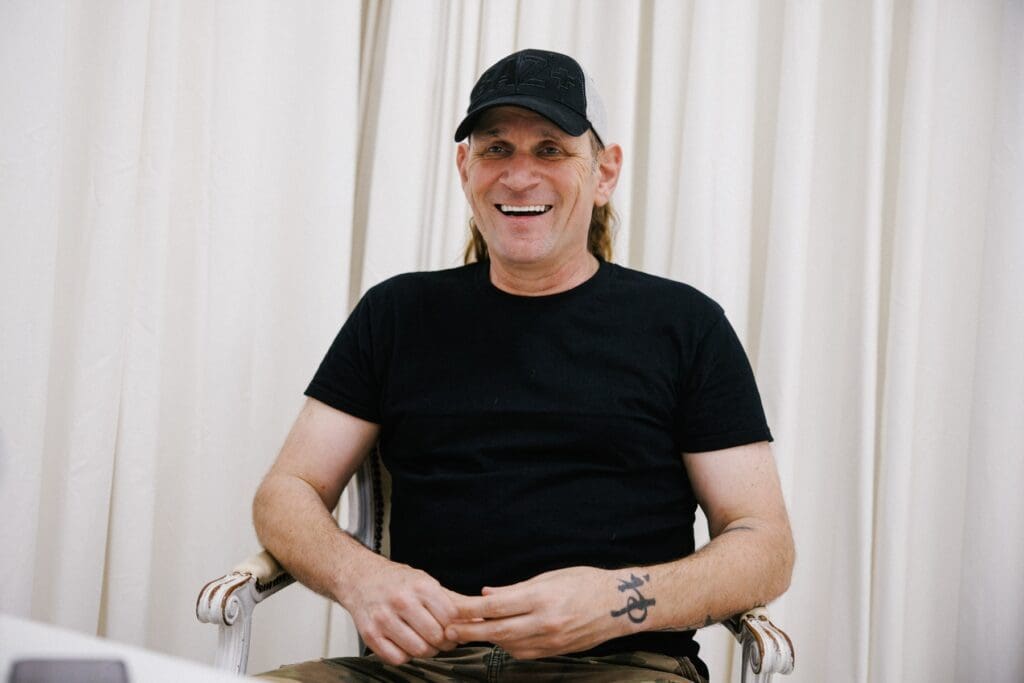
However, during the COVID-19 pandemic, many people envisioned an imminent apocalypse. How did you endure that?
Not only here, but globally, musicians were among the first to be sidelined, with the argument that attending a concert is not an essential activity compared to, for instance, baking bread. And of course, we were the last to be let back into business. We understood it, but it didn’t go down well. Our lifestyle has changed drastically. And although we have gained some strength in the meantime, but undeniably, we are also anguished. Unfortunately, many people around me got sick and even died. It is not yet possible to say what the long-term consequences of the pandemic are, but rest assured, there will be some damn powerful lessons learned down the road.
During this period, due to a government decree, you were once again told that Tankcsapda was a band close to NER (System of National Cooperation). You reacted furiously.
We were overwhelmed, the glass was full. We’ve been going in a straight line for decades, and then we allegedly made a perceived mistake and were immediately attacked. It’s not that they called me a ‘Fidesz voter’, it’s the injustice that hurts. They hurt me for no reason. There is that old joke when rumours begin to spread about the Roman centurion about his alleged gayness. So, he comes up with the idea to embrace a thousand women in the Colosseum. But he passes out after the 998th, and the crowd slowly starts chanting that he’s gay. Sometimes you need to speak up if you feel that what others are doing to you is unfair. We have always made it clear that we welcome everyone in our audience, from those who expect deep thoughts to those who want to party, from Fidesz voters to Gyurcsányists. Just don’t hurt each other. We want to bring people together, so let’s come together instead of drifting apart! It would be strange if we adopted a friendlier tone with one political faction over the other following these events.
Ten years ago, you also claimed that the parties were knocking on the door of the band. Still?
Not that much anymore. Not only parties, but also other organisations fighting for various causes would be happy if Tankcsapda stood by them with its popularity. There’s nothing wrong with that, except that’s not the way we’re going. When it comes to political groups, we generally lean towards showing them the way out—as we have always done.
In recent times, however, there has been a resurgence in the involvement of pop icons in social causes, with examples including their participation in student demonstrations.
We have already donated money to the organisation for people with disabilities in Debrecen, and we raise awareness for the sake of those facing challenging circumstances. However, we are just a band comprised of a guitarist, a bassist-singer, and a drummer. Our job is to captivate our followers, liberating them from the monotonous routine of everyday life, and freeing them from their entanglements. That’s our ‘business’, I would say. As for the student demonstrations, we were never specifically invited to participate. While we empathise with the concerns of the teachers, we recognise that it is an issue that affects many. Our aim is to create music that transcends the ‘high school level’, appealing to a diverse audience and not limited to a specific group or cause. And we try to do this as well as we can.
What lies ahead in the coming months? Your last album was released in 2019, so when can we anticipate the release of your next piece?
Currently, a song and a music video are gaining momentum, and we had a great gig on 30 June at Budapest Park; then parties will follow within and beyond the borders of Hungary. But the ideas that have been collected in the previous years will sooner or later be unleashed. To sum up,
we will have a new album soon.
Recently, more and more people are releasing their songs individually, and the music indusrty is changing. We are also a bit old-fashioned in this respect. Irrespective of the medium, be it vinyl, CD, or digital, we strongly believe in the album format. The world has sped up, today’s hits are sometimes only one and a half or two minutes long—perhaps these artists have nothing more to say. It’s a matter of opinion, whether it’s good or not, but the spin has become pretty dizzy.
Do you listen to new music?
Absolutely, there are great talents out there. But I wouldn’t want to name anyone, there are so many good performers, from almost every genre. We are committed to staying current and keeping pace with the music industry. And although Tankcsapda will celebrate its thirty-fifth anniversary next year, our objective is not to dwell in nostalgia—I can confidently state that.
To read the original article, click here.
Related articles:

